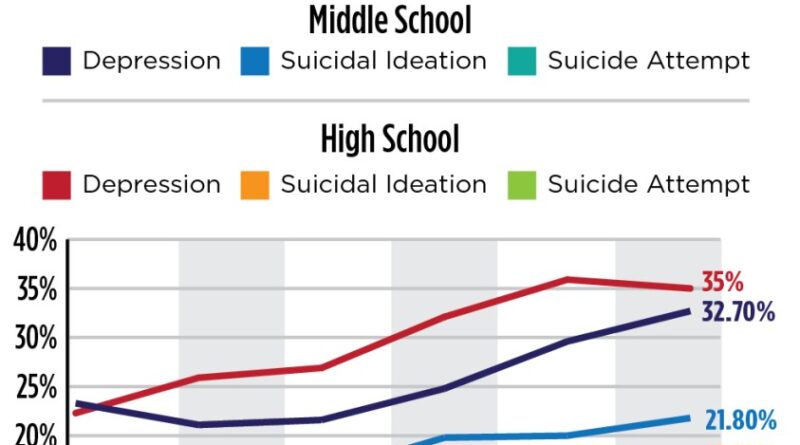Sweetser cannot support its mental health services in Maine’s 18 school districts
Students in 18 Maine school districts may have less mental health support next year after a nonprofit that provides long-term treatment announced it will not able to maintain current staffing levels.
Sweetser, a behavioral health organization, had 80 school nurses working with more than 2,300 children in 100 public schools last school year. It’s a service that many school officials say students desperately need because the state is reaching out to youth mental health problems, and school counselors and social workers need more support. nonprofits like Sweetser.
Sweetser’s decision to cut services comes after the program posted a $1.5 million deficit this fiscal year, said CEO and President Jayne Van Bramer. He said the nonprofit does not want to cut school services, but providing them has become financially unsustainable.
Their school nurses spend their days driving between schools, meeting with students, teachers, guidance counselors and social workers, calling parents, filling out paperwork and doing a variety of other tasks. But because they are paid by student insurance, they are only paid for face-to-face time with clients during treatment sessions. That fee system is unsustainable, Van Bramer said.
He would not say which school districts would lose services and to what extent — the union has just begun to have discussions with superintendents about service changes.
“It was a very difficult decision, and we know we are working hard to minimize the impact it will have on our students, our families and our staff,” Van Bramer said.
‘SIGNIFICANT PROBLEMS IN MENTAL LIFE’
Teens across Maine continue to struggle with serious mental health issues, and school officials say students need more support.


According to the 2023 Maine Integrated Youth Health Survey, more than a third of Maine middle and high school students experience depression, nearly a quarter self-harm in their lifetime, and nearly 20% thought about suicide, about 16% made a plan, and 8% tried to kill themselves.
Those numbers are higher than 10 years ago, when 23% of Maine middle and high school students struggled with depression, 17% engaged in self-harm, 16% considered suicide, 12% made a plan and 7% made an attempt, according to the same survey in 2013.
“Maine students and communities have significant mental health issues,” said Brunswick Superintendent Phil Potenziano. “We have a long way to go to ensure our students get the support they need to succeed.”
At the same time, student homelessness is on the rise, and school leaders say they have more students than ever with anxiety, social struggles and gambling.
Maine Children’s Alliance Senior Policy Officer, Rita Furlow, said that providing mental health services at school is important because it provides easy access from a familiar face and allows children to get support as quickly as possible. possible.
“Having someone on campus can mean the difference between (a student) taking the opportunity to talk to someone right away versus trying to schedule an appointment two weeks out,” Furlow said.
Van Bramer said having nurses in school buildings allows adults in a student’s life to interact, solve problems and create a blanket of support for the student.
This is especially notable as wait times for mental health support across Maine continue to increase.
GET SUPPORT ON THE GO
In this year’s legislative session, lawmakers took up a bill that would have spent $2.7 million over two years to help schools hire social workers and family doctors through organizations like Sweetser. The bill passed the first House and Senate votes – but was never funded.
Van Bramer said Sweetser is lobbying and intends to push for new legislation in January that would change the way nurses are reimbursed for providing school services and allow them to be paid for the work they do. which does not involve direct contact with customers.
He said it is in the children’s best interest that schools be able to provide as many mental health supports as possible.
“Everyone has seen an increase in youth mental health problems,” he said. “There is a need, and this program is working.”
School districts often provide mental health support to students through school counselors and social workers. But they often have large caseloads and therefore have limited time.
Therapists, like those who work for Sweetser, provide an additional layer of mental health support and work with students and their families on difficult, long-term issues.
All Sweetser nurses must have a master’s degree in social work, psychology or mental health counseling. Maine requires school counselors to have a master’s in school development, and social workers must have a master’s in social work.
Potenziano, Brunswick’s superintendent, said the reduction in Sweetser’s services is disappointing because the mental health needs of students are so high, but since COVID-19, the district has hired school counselors and social workers. and signed agreements with other local providers and independent social workers. maintaining deep mental health support.
Potenziano hopes the district will be able to add more services if Sweetser restores services to Brunswick schools.
Van Bramer says it’s important for nonprofits like Sweetser to be able to provide long-term mental health support to students.
“By investing in our youth and addressing these issues now, we can prevent serious mental health problems and expensive treatment options later,” he said.
Copy Story Link
« The previous one
Photo album: Lisbon High School sends 69 students
Next ”
Related Stories
#Sweetser #support #mental #health #services #Maines #school #districts


Invalid username/number.
Please check your email to confirm and complete your registration.
Use the form below to reset your password. When you have sent your account email, we will send you an email with a reset code.